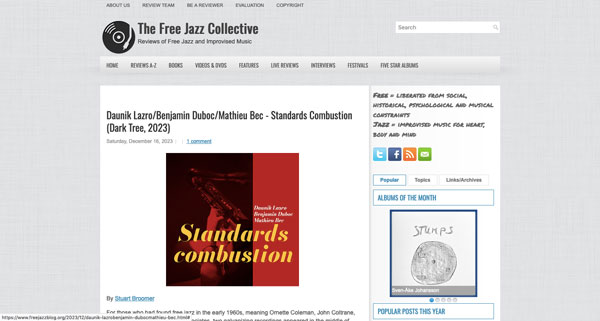• Stuart Broomer // The Free Jazz Collective (16 décembre 2023)
For those who had found free jazz in the early 1960s, meaning Ornette Coleman, John Coltrane, Eric Dolphy, Cecil Taylor and associates, two galvanizing recordings appeared in the middle of the decade: Albert Ayler’s Spiritual Unity and John Coltrane’s Meditations. They’re among the few records of the period that I ever listen to, though I can almost do so without playing them, so strongly did they embed themselves in my consciousness. If I have such a thing, they belong in my permanent list of top ten recordings.
Based on Standards Combustion, a sometimes raw-edged, nine- track, LP-length (even the two-column track list looks like an LP) journey into the music of his youth, Daunik Lazro, born 1945 and sometimes playing partner to two other distinguished contemporaries and tenor players, Joe McPhee and Evan Parker, might feel the same way. Here he visits pieces by Ayler, Coltrane, Steve Lacy and Wayne Shorter along with his own homage to Lacy and a couple of collective improvisations, ideally accompanied by the spare, precise, structural yet empathetic, bass/drums team of the younger Benjamin Duboc and Mathieu Bec. Consider it revolutionary nostalgia, a sometimes soul-baring, galvanizing music that reaches through time for emotional renewal,
The CD opens with Ayler’s anthemic “Ghosts”, played with an Ayler-like exaggerated wail that shifts between laughter and tears, but which spurs a Lazro solo distinguished by his own upper-register cries and spears of sound. These are difficult times, but wondrous, too. With Rodrigo Amado’s version with The Bridge, this marks two great versions of “Ghosts” released just six weeks apart, the closest that’s happened to the original pressing of Spiritual Unity.
Lacy’s “Deadline” is next, a wonderfully oblique, linear and wandering treatment, before Ayler’s “Mother” inspires another rich exploration of the melody and Lazro’s distinctive solo voice. How economical is Lazro? Together the two Ayler tunes clock in under eight minutes: you could get them both on a seven-inch 45rpm, the perfect tribute to Ayler’s own temporal economy.
Shorter’s “Nefertiti” is a subtly dissonant, rich harmonic weave, while Lazro’s composition “Line-Up for Lacy” is an oddly sweet dirge that brings Duboc’s arco playing to the fore. There’s some lyrical interactive play amongst the trio and a definite mood shift with some powerful multiphonic blasts from Lazro before the concluding theme statement.
The CD continues, alternating collective improvisations and late Coltrane compositions. “R.Métégal” is hard-edged, focussed, three-way improvisation; “Tight Rope” is brief and rhythmically playful. The late period Coltrane pieces – “Vigil” and “Love”, both from 1965, the latter first turning up as an add-on on later CDs, the latter part of Meditations – are imbued with an emotional intensity and testamentary clarity comparable to Coltrane’s own, with Lazro’s own slightly darker tone, higher harmonics less apparent in his sound, and a less keening, yet even more restless, impulsive feel to his lines.
Revolutionary nostalgia? This works pays meaningful tribute to one of the greatest (however painfully brief) moments in jazz history, revitalizing memory and animating the present.
• • • • • • • • • • • • • • • • • • • • • • • • • • • • • • • • • • • • • • • • • • • • • • • • • • • • • • • • • • • • • • • •

Sorry, the comment form is closed at this time.